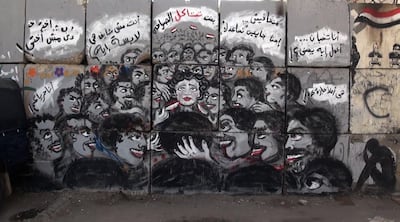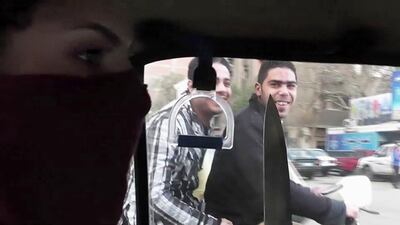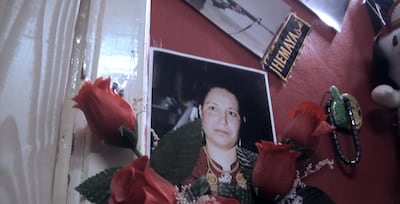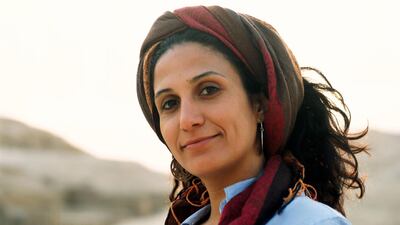Samaher Alqadi is "tired but happy". The filmmaker recently finished her first feature-length work, As I Want, only days before it will premiere online at this week's Berlin International Film Festival.
A long, long odyssey – "eight years of pregnancy", as she describes it – as gestations go, this one has been painful beyond belief at times, she says. "I worked so hard emotionally, physically, mentally, for all of these years." The relief in her voice that she can soon share it with the world is palpable.
'It opened up a lot of issues inside me'
A documentary that feels like a protest song, As I Want is on one level a stark look at the treatment of women in Egypt, where Alqadi lived for 18 years. The film begins in 2013, exactly two years on from the January 25 revolution that brought an end to the rule of Hosni Mubarak. In Cairo's Tahrir Square, as demonstrations erupt against Mubarak's successor, now former president Mohamed Morsi, female protesters are targeted via a series of violent sexual assaults.
Shocking footage shows one girl assaulted by several men, caught on camera by a friend of Alqadi's. It's no isolated incident – across four days in late June 2013, a staggering 187 women were assaulted, according to the film.

Another friend recounts an equally disturbing story, of being groped in a crowd as she tried to find sanctuary in an ambulance.
“It really made me furious,” says Alqadi. “It opened up a lot of issues inside me that I wasn’t even aware of, that I didn’t even talk about with myself.”
The budding filmmaker picked up her camera and began filming, even capturing images from her balcony. "I didn't really know that I was going to end up making a film … I was just angry, and I really wanted to do something."
Over the next few months, she documented demonstrations, as women took to the streets to fight back against these assaults, and the vigilante anti-rape patrols that began circulating through Cairo.
A candid and at times brutal reflection
In one scene Alqadi holds up a kitchen knife when she’s in a taxi as two men on a moped pass by. “It’s because of the harassment incidents?” they say, laughing, almost incredulous. “It’s a very aggressive scene,” admits Alqadi.

"But for me, it sends a very powerful message – a symbol that we are not afraid any more. We're not going to be silent any more. If I have to carry a knife, I will carry a knife."
While As I Want captures the growing sense of anger on the streets and in heated discussions between Alqadi and her friends, it's also an exposing look inwards at her own life. Her mother died in March 2013, shortly after Alqadi first started filming.
"That put me in a very deep black hole in my heart because I had a very difficult relationship with her. And we never connected. And for her, I was too much. I was not listening. I was the girl who wants to break all the rules."
Alqadi reflects with extreme frankness in the film on her relationship with her mother. "She has lived and died thinking that this is the way a woman should be living: ashamed of their body, not allowed to love, not allowed to laugh, that education is not important," Alqadi says. "I sometimes wish she was still around, for her to see what I wanted to tell her.""
'I felt I was pregnant with the whole world'
If anything offers hope in the film, it's that Alqadi also documents her pregnancy – with her second boy – with beautiful black-and-white shots of her belly. "This is one of the reasons it took a long time to make. It was difficult for me to see myself in front of the camera." She calls the film "a healing process … to be able to understand who I am as a woman".

As exposing as it was, Alqadi grew in strength. “I wasn’t scared at all. I felt I was pregnant with the whole world. I felt a big strength.”
Born in Palestine, in the Jalazone refugee camp, Alqadi has lived in France for the past three years, with her husband and two sons, who are 11 and 6. Her youngest was still in her womb during filming, but her eldest appears on screen – terrified by the protests outside and crying for the comfort of his iPad. "He's a revolutionary kid. I mean, he was 1 year old when Mubarak stepped down, and he was 6 years when we left [Egypt]."
Her boys have seen the film now. "My children are very happy to finish this film," she says, with a laugh. "From their childhood room in Cairo to Fontainebleau in Paris to the south of France … they've been living every single minute of making this film."
If the proposed in-person screening in Berlin takes place in June, they will get a special mention when Alqadi finally presents it to an audience. "They are the first ones I want to thank because they really suffered a lot with us through this journey."
Having spent the first three years of making As I Want without any money, Alqadi clearly has tremendous endurance. She has also started scripting her next project – a narrative feature called Rainbow – and it sounds no less confrontational.
"It's about children who have been born and raised in a war zone – how, generation by generation, they became aggressive and violent." Let's hope it doesn't take her another eight years to bring it to our screens.
The Berlin International Film Festival runs until tomorrow; www.berlinale.de

